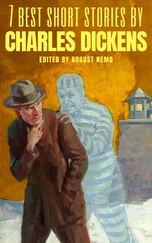Charles Dickens - Dickens' Stories About Children Every Child Can Read
Здесь есть возможность читать онлайн «Charles Dickens - Dickens' Stories About Children Every Child Can Read» — ознакомительный отрывок электронной книги совершенно бесплатно, а после прочтения отрывка купить полную версию. В некоторых случаях можно слушать аудио, скачать через торрент в формате fb2 и присутствует краткое содержание. Издательство: Иностранный паблик, Жанр: foreign_prose, на английском языке. Описание произведения, (предисловие) а так же отзывы посетителей доступны на портале библиотеки ЛибКат.
- Название:Dickens' Stories About Children Every Child Can Read
- Автор:
- Издательство:Иностранный паблик
- Жанр:
- Год:неизвестен
- ISBN:нет данных
- Рейтинг книги:4 / 5. Голосов: 1
-
Избранное:Добавить в избранное
- Отзывы:
-
Ваша оценка:
- 80
- 1
- 2
- 3
- 4
- 5
Dickens' Stories About Children Every Child Can Read: краткое содержание, описание и аннотация
Предлагаем к чтению аннотацию, описание, краткое содержание или предисловие (зависит от того, что написал сам автор книги «Dickens' Stories About Children Every Child Can Read»). Если вы не нашли необходимую информацию о книге — напишите в комментариях, мы постараемся отыскать её.
Dickens' Stories About Children Every Child Can Read — читать онлайн ознакомительный отрывок
Ниже представлен текст книги, разбитый по страницам. Система сохранения места последней прочитанной страницы, позволяет с удобством читать онлайн бесплатно книгу «Dickens' Stories About Children Every Child Can Read», без необходимости каждый раз заново искать на чём Вы остановились. Поставьте закладку, и сможете в любой момент перейти на страницу, на которой закончили чтение.
Интервал:
Закладка:
To enable this girl to earn her few weekly shillings, it was necessary for the Child of the Marshalsea to go through a careful form with her father.
"Fanny is not going to live with us, just now, father. She will be here a good deal in the day, but she is going to live outside with uncle."
"You surprise me. Why?"
"I think uncle wants a companion, father. He should be attended to and looked after."
"A companion? He passes much of his time here. And you attend and look after him, Amy, a great deal more than ever your sister will. You all go out so much; you all go out so much."
This was to keep up the form and pretense of his having no idea that Amy herself went out by the day to work.
"But we are always very glad to come home father; now, are we not? And as to Fanny, perhaps besides keeping uncle company and taking care of him, it may be as well for her not quite to live here always. She was not born here as I was you know, father."
"Well, Amy, well. I don't quite follow you, but it's natural I suppose that Fanny should prefer to be outside, and even that you often should, too. So, you and Fanny and your uncle, my dear, shall have your own way. Good, good. I'll not meddle; don't mind me."
To get her brother out of the prison; out of the low work of running errands for the prisoners outside, and out of the bad company into which he had fallen, was her hardest task. At eighteen years of age her brother Edward would have dragged on from hand to mouth, from hour to hour, from penny to penny, until eighty. Nobody got into the prison from whom he gained anything useful or good, and she could find no patron for him but her old friend and godfather, the turnkey.
"Dear Bob," said she, "what is to become of poor Tip?" His name was Edward, and Ted had been changed into Tip, within the walls.
The turnkey had strong opinions of his own as to what would become of poor Tip, and had even gone so far with the view of preventing their fulfilment, as to talk to Tip in urging him to run away and serve his country as a soldier. But Tip had thanked him, and said he didn't seem to care for his country.
"Well, my dear," said the turnkey, "something ought to be done with him. Suppose I try and get him into the law?"
"That would be so good of you, Bob!"
The turnkey now began to speak to the lawyers as they passed in and out of the prison. He spoke so perseveringly that a stool and twelve shillings a week were at last found for Tip in the office of a lawyer at Clifford's Inn, in the Palace Court.
Tip idled in Clifford's Inn for six months, and at the end of that term sauntered back one evening with his hands in his pockets, and remarked to his sister that he was not going back again.
"Not going back again?" said the poor little anxious Child of the Marshalsea, always calculating and planning for Tip, in the front rank of her charges.
"I am so tired of it," said Tip, "that I have cut it."
Tip tired of everything. With intervals of Marshalsea lounging, and errand-running, his small second mother, aided by her trusty friend, got him into a warehouse, into a market garden, into the hop trade, into the law again, into an auctioneer's, into a brewery, into a stockbroker's, into the law again, into a coach office, into a wagon office, into the law again, into a general dealer's, into a distillery, into the law again, into a wool house, into a dry goods house, into the fish-market, into the foreign fruit trade, and into the docks. But whatever Tip went into he came out of tired, announcing that he had cut it. Wherever he went, this useless Tip appeared to take the prison walls with him, and to set them up in such trade or calling; and to prowl about within their narrow limits in the old slipshod, purposeless, down-at-heel way; until the real immovable Marshalsea walls asserted their power over him and brought him back.
Nevertheless, the brave little creature did so fix her heart on her brother's rescue that, while he was ringing out these doleful changes, she pinched and scraped enough together to ship him for Canada. When he was tired of nothing to do, and disposed in its turn to cut even that, he graciously consented to go to Canada. And there was grief in her bosom over parting with him, and joy in the hope of his being put in a straight course at last.
"God bless you, dear Tip. Don't be too proud to come and see us, when you have made your fortune."
"All right!" said Tip, and went.
But not all the way to Canada; in fact, not further than Liverpool. After making the voyage to that port from London, he found himself so strongly impelled to cut the vessel, that he resolved to walk back again. Carrying out which intention, he presented himself before her at the expiration of a month, in rags, without shoes, and much more tired than ever.
At length, after another period of running errands, he found a pursuit for himself, and announced it.
"Amy, I have got a situation."
"Have you really and truly, Tip?"
"All right. I shall do now. You needn't look anxious about me any more, old girl."
"What is it, Tip?"
"Why, you know Slingo by sight?"
"Not the man they call the dealer?"
"That's the chap. He'll be out on Monday, and he's going to give me a berth."
"What is he a dealer in, Tip?"
"Horses. All right! I shall do now, Amy."
She lost sight of him for months afterwards, and only heard from him once. A whisper passed among the elder prisoners that he had been seen at a mock auction in Moorfields, pretending to buy plated articles for real silver, and paying for them with the greatest liberality in bank-notes; but it never reached her ears. One evening she was alone at work – standing up at the window, to save the twilight lingering above the wall – when he opened the door and walked in.
She kissed and welcomed him; but was afraid to ask him any question. He saw how anxious and timid she was, and appeared sorry.
"I am afraid, Amy, you'll be vexed this time. Upon my life I am!"
"I am very sorry to hear you say so, Tip. Have you come back?"
"Why – yes."
"Not expecting this time that what you had found would answer very well, I am less surprised and sorry than I might have been, Tip."
"Ah! But that's not the worst of it."
"Not the worst of it?"
"Don't look so startled. No, Amy, not the worst of it. I have come back, you see; but — don't look so startled – I have come back in what I may call a new way. I am off the volunteer list altogether. I am in now, as one of the regulars. I'm here in prison for debt, like everybody else."
"Oh! Don't say that you are a prisoner, Tip! Don't, don't!"
"Well, I don't want to say it," he returned in unwilling tone; "but if you can't understand me without my saying it, what am I to do? I am in for forty pound odd."
For the first time in all those years, she sunk under her cares. She cried, with her clasped hands lifted above her head, that it would kill their father if he ever knew it; and fell down at Tip's worthless feet.
It was easier for Tip to bring her to her senses than for her to bring him to understand that the Father of the Marshalsea would be beside himself if he knew the truth. Tip thought that there was nothing strange in being there a prisoner, but he agreed that his father should not be told about it. There were plenty of reasons that could be given for his return; it was accounted for to the father in the usual way; and the collegians, with a better understanding of the kind fraud than Tip, stood by it faithfully.
This was the life, and this the history, of the Child of the Marshalsea, at twenty-two. With a still abiding interest in the one miserable yard and block of houses as her birthplace and home, she passed to and fro in it shrinking now, with a womanly consciousness that she was pointed out to everyone. Since she had begun to work beyond the walls, she had found it necessary to hide where she lived, and to come and go secretly as she could, between the free city and the iron gates, outside of which she had never slept in her life. Her original timidity had grown with this concealment, and her light step and her little figure shunned the thronged streets while they passed along them.
Читать дальшеИнтервал:
Закладка:
Похожие книги на «Dickens' Stories About Children Every Child Can Read»
Представляем Вашему вниманию похожие книги на «Dickens' Stories About Children Every Child Can Read» списком для выбора. Мы отобрали схожую по названию и смыслу литературу в надежде предоставить читателям больше вариантов отыскать новые, интересные, ещё непрочитанные произведения.
Обсуждение, отзывы о книге «Dickens' Stories About Children Every Child Can Read» и просто собственные мнения читателей. Оставьте ваши комментарии, напишите, что Вы думаете о произведении, его смысле или главных героях. Укажите что конкретно понравилось, а что нет, и почему Вы так считаете.












